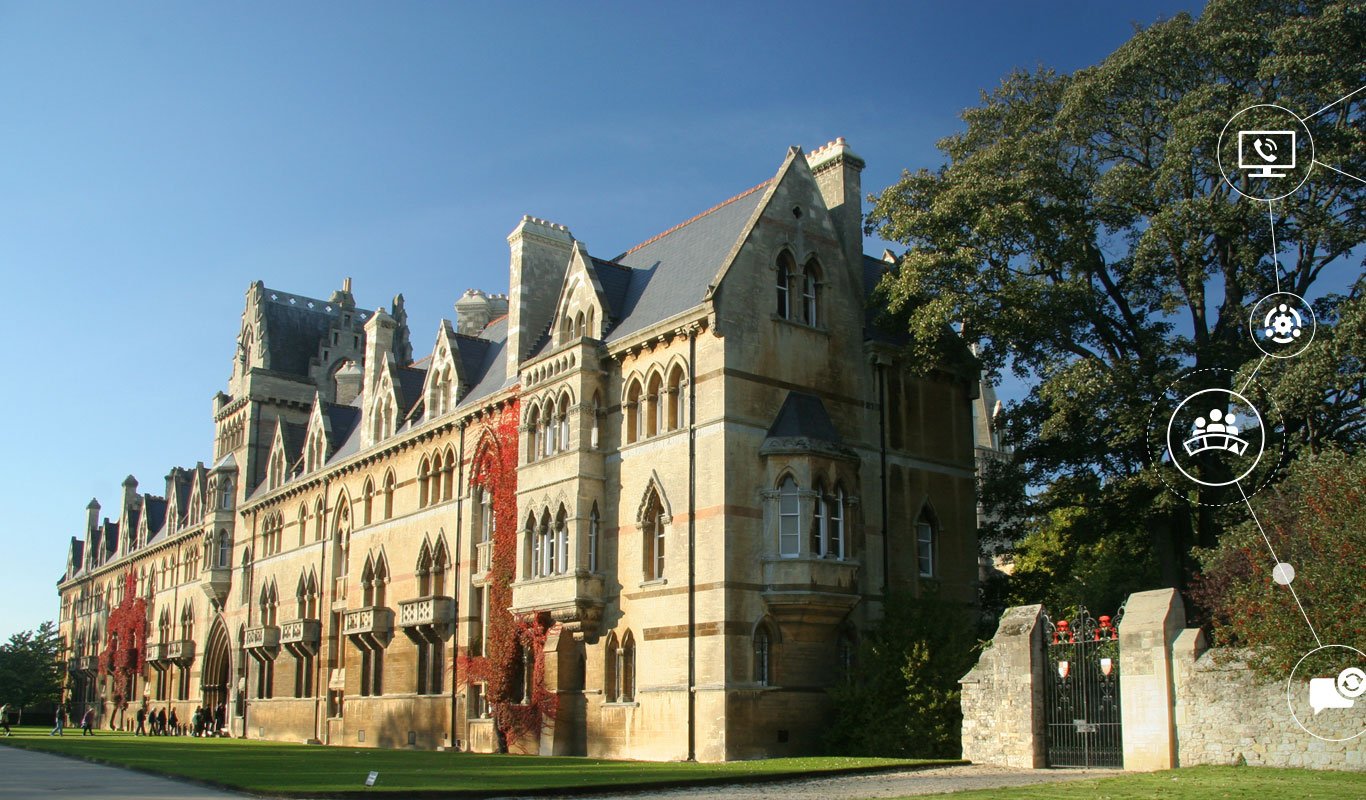Ivanti Neurons for ITSM
Modernize service delivery for IT and beyond. Ivanti Neurons for ITSM offers full flexibility to deploy in the cloud, on-premises or a hybrid combination.

Attracting the bright and the brilliant, Oxford’s alumni include Nobel laureates, heads of state, as well as world-renowned poets, authors and artists. Just like any leading academic institution today, Oxford employs digital technologies to help support its students and faculty – technologies that need support and maintenance to operate efficiently.
Consisting of 38 self-governing colleges, 100+ departments, 350 central IT staff, 300 distributed IT staff and 30,000 end users, the university has a large, federated IT support function and end user base. As such, it represents a significant challenge in terms of IT operations, with the service desk playing a crucial role in providing essential services.
Until recently, Oxford had three independent IT teams, each with its own service desk. These service desks consisted of business services (e.g. student records, HR, finance), computing services (e.g. backbone network, email) and the ICT support team (e.g. managed desktop solutions).
With multiple systems to manage, the university found it increasingly difficult to provide IT-based services and metrics. In 2012, it instigated a project to consolidate the three service desks. To adopt best practices while retaining the value of its existing IT processes, a robust IT service management solution was essential to meet Oxford’s goals.
The university also required a flexible cloud solution that could bring these central IT groups together, while supporting its IT users from a single point of contact. It was also important to provide reliable self-service functions and an easily maintained online portal for its student community. After an 11-month selection process, which required vendors to provide full-day demos, Oxford selected Ivanti over other leading SaaS vendors due to the strength and depth of its features and the ease with which it can be set up, customized and used.
As well as having a large de-centralized IT user base, university institutions represent a unique IT challenge for several reasons – the University of Oxford being no exception. First, the University must support IT use for alumni as well as present students, staff and visitors – in Oxford’s case extending its potential IT user base by more than 250,000. In addition, the University on-boards thousands of new students each year. This is a perennial challenge in the education sector, resulting in a huge spike in calls/requests to IT at the start of the academic year – increasing the burden on service desk support considerably.
The fact that the University of Oxford has 38 self-governing colleges also makes it dissimilar to most IT deployments, where all users and departments would use the same service. Instead, each college has a small, autonomous IT team and service desk and maintaining this independence, while ensuring compatibility with central IT, was of vital importance to the consolidation project. Each college now has the option to adopt the cloud based Ivanti solution as required to provide further consolidation and simplification of IT support.
In addition to college autonomy, the issue of multiple IT user identities presented a significant challenge to the University, as it does for university IT departments globally. Unlike most business environments where each IT user has a single identity, university IT users may have three or four depending on their role. It’s not uncommon for a university lecturer to study on another course, work on a research project team and hold a formal position at their college. Before a decision was made, the Ivanti solution had to prove it could effectively manage access rights for multiple IT user identities and segment this data in a logical manner.
Being able to access everything from a web browser was an important consideration for Oxford, given the variety of devices, IT processes, and applications supported. For example, a University of Oxford research team heading to Brazil made a service desk inquiry regarding remote IT support and requested that their laptops and IT devices could be made compatible with a 24V vehicle battery, to allow them to stay online in their remote mountain research camp.
Closer to home, some IT users have requested that IT services support email use from their car dashboard. As part of the vendor-selection process, Ivanti had to demonstrate the use of its online portal from a variety of devices and web browsers to prove its ability to provide a consistent user experience.
“A student’s digital experience is an increasingly important part of university life,” said John Ireland, Director of Customer Services at University of Oxford. “IT has a huge impact on a student’s ability to study and communicate with their peers and educators, so making sure they have the best digital experience possible is essential. With Ivanti, straight away I could see that we were purchasing a very powerful and configurable tool, which would provide visibility across our entire IT support operations. The ‘out of the box’ processes available with Ivanti were easily configured to map with our project goals. Our partnership with Ivanti will play an important role in keeping thousands of IT users operational and our IT teams happy.”
Kevin J Smith, Senior Vice President at Ivanti, concluded, “We’re extremely proud of our Ivanti solution and the University of Oxford project is a perfect testament to its capabilities. Indeed, we’re helping Oxford meet some unique and complex challenges, while demonstrating IT service management best practice at all times.”
Future plans for the Ivanti deployment include adding capabilities to manage more services, rolling out the platform to other colleges, and using Ivanti Service Manager for case and endpoint management.
Note: A customer’s results are specific to its total environment/experience, of which Ivanti is a part. Individual results may vary based on each customer’s unique environment.